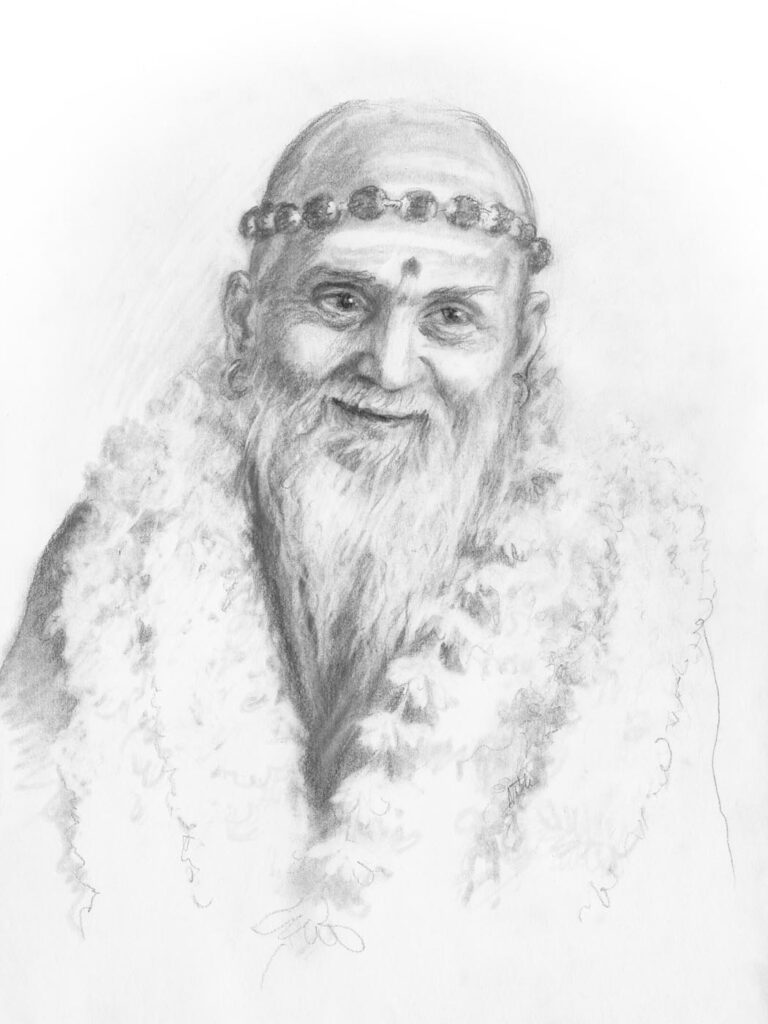It takes practice to unlock the intuitive abilities of the mind, but the effort is worth it, bringing inner guidance for a rich life
by Satguru Bodhinatha Veylanswami

Over the past two years, there has been a remarkable surge of interest in the field of artificial intelligence (AI). An evolutionary development is the emergence of generative AI, particularly large language models, exemplified by popular platforms like ChatGPT. These systems have the ability to provide answers to questions in a human-like way at remarkable speed. Toward the end of 2024, Apple unveiled Apple Intelligence, a suite of AI features powered by both in-house and third-party models. That gave me the insight that Hinduism has its own innate form of AI. I call it Adhyatma Intelligence.
The Sanskrit word adhyatma means spiritual. So, Adhyatma intelligence, or spiritual intelligence, refers to knowledge that comes from the soul. Such knowledge is commonly referred to as intuition, superconsciousness, inner voice, insight or foreknowledge. A Sanskrit term for intuition is anubhava bodha, which means knowledge from inner experience. This is distinct from the intellectual knowledge acquired by studying books, for which the Sanskrit term is buddhi jnana. My guru, Sivaya Subramuniyaswami, gave this description of intuition: “The first sadhana, therefore, is to always hold the overview and cling in your memory to the intuitive flashes that come as a result [of your practices]. These intuitive flashes come from deep within and are the only thing that should be remembered, for this is your jnana, your insightfulness, your own wisdom, breaking through.”
We commonly hear the phrase “awakening our intuition,” implying that it is not currently functioning. Gurudeva presented another perspective. “Intuition day by day occurs spasmodically, but it does occur. And systematically one can gear his observation of his own intuitional faculties and find out exactly when these intuitive functions occur within him. It is a well-defined fact that we have the faculty of precognition of coming events. It is also concurrently known that feelings of fear may precede impending danger. It is for the individual to disentangle and sort out within his own daily experiential pattern which is which. In this way, he becomes knowledgeable in the great university of his own mind as to what is a daily intuitive occurrence and what is not.”
Imagine soft music being played in a noisy room. The music is there, but it is drowned out by the noise. It is the same in our mind, where the constant mental noise of thoughts and feelings prevents us from hearing our quiet inner voice. But sometimes our inner voice is louder than the mental noise, such as when facing danger. Imagine a child, playing outside, who is about to be hurt. From inside the house, the mother senses the danger and runs to protect her child, arriving just in time.
It is important to learn to distinguish genuine intuition from ordinary thought. Gurudeva gives a useful explanation of the difference. “Desires come through feeling, warmth of emotion, as do thoughts, schemes, ways of manipulating the media forces for one’s own personal benefit or that of a loved one. This is contrary to the power of intuition, which runs cold and is direct, like a bolt of lightning in the inner sky or the subtle rainbow of an etheric aura which bypasses the processes of current thinking, giving answers before the question and solving problems before they have accrued.”
A key practice enabling the regular experience of intuition is to observe how our thinking mind functions. This is facilitated by practicing meditation regularly over a long period of time. When attempting to meditate, our thoughts tend to quickly run to past events and future plans. We must gradually control this pattern through our meditation practices. In fact, that is the definition of yoga that Patanjali gives in Sutra 2 of his classic work, Yoga Sutras: “Yoga is the restraint of mental activities.” Sutra 3 takes this idea one step deeper within. “Then awareness abides in its essential nature.” When mental activity is restrained, the soul’s faculty that witnesses thoughts naturally turns in on itself, remaining temporarily aware only of itself until thoughts again arise. A person is at that moment in his soul nature, which is, of course, the source of intuition.
A second practice is needed—keen observation. Gurudeva explains: “Observation is the first faculty of the awakening of the superconscious regions. This observation is cultivated by abstinence from excessive talk.” Unfortunately, excessive talk is a strong habit. Constant talk overloads the subconscious mind and is the source of unwanted thoughts that arise when we try to practice meditation.
To avoid excess talk, it is helpful to establish a weekly time of silence—for example, one hour every Sunday during which talk completely ceases. For those who are retired, the period can be longer. The discipline of remaining silent is called mauna in Sanskrit. Fortunate individuals have a schedule that allows them to practice mauna for an entire day every week. Ardent seekers in India may take vows of silence for months, or longer.
Paramaguru Yogaswami didn’t experience AI, but he spoke of what I’m calling Adhyatma Intelligence. He worked intuitively, responding according to “inner orders.” He explained this process, “When you are pure, you live like water on a lotus leaf. Do what is necessary, what comes to you to do, then go on to the next order you receive, and then to the next that comes.” In this way, he prodded visitors to follow their intuition. He advised, “Boldly act when you receive orders from within. You need not wait until all details are in order. If you wait for everything to be worked out, you may miss your chance. Have faith and do the work that comes from within. Money will trail after you if you are responding to divine orders. Helpers will come. Everything will come. You have only to follow carefully that which comes from within.”
When asked how to find one’s inner voice, he offered, “Summa iru. Be still! Be still, and what you need will come to you.” “Summa iru!” was his constant command. He practiced this himself and heeded the instructions that came. Someone would ask him a question and he would wait for his inner orders. If he felt no orders, he would do nothing. Once a man drove up to Swami as he was walking through town and asked if he could drive him somewhere. “No orders,” Swami replied and waved the man on. A few minutes later the driver came by and stopped again. “Now I have my orders,” Swami said, and got into the car. Gurudeva’s and Yogaswami’s advice on how to find our intuition is the same. Gurudeva: “Practice mauna. Abstain from excessive talk.” Yogaswami: “Be still. Summa iru!”
Here are two useful techniques for tapping your intuition to solve a problem. The first is that if you find yourself unable to solve a problem and are thinking in circles about it without making any progress, take a break. Take a fifteen-minute walk. Come back and look at the problem again. Sometimes the answer will be immediately self-evident. Relaxing, taking the mind off the problem, allows your intuition to be known.
Second, at night just before sleep, write down the problem. Make sure your description is accurate and complete. Rewrite it until you have captured it fully. Go to sleep with the expectation that you will awaken in the morning with the intuitive insight that eluded you.
The two types of knowledge, anubhava bodha and buddhi jnana, are distinct but complementary. Anubhava bodha is using the soul’s faculty of intuition. Buddhi jnana is using the intellect’s abilities, such as memory, reason, logic and observation. The knowledge we acquire through the intellect can provide the basis for intuitive insight. In science, for example, mastering the existing knowledge in a field, such as quantum physics, can be the foundation for unfolding deeper insights in that field through intuition. In spirituality, studying Hindu texts such as the Yoga Sutras can be the inspiration for inner experience of the truths the texts are describing—for example, gaining inner knowledge and experience about your soul’s inherent omnipresence.

Such a well written article, that sucked me in from the title.
AI Great Analysis as Adhyatam Inteligence. I Really bow to this AI only. Author of Book If You Meet Me Alone.
I really like how this article was written